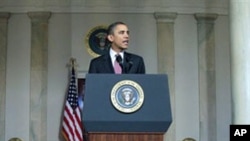President Obama's remarks Friday about Egypt contained strong words in support of people seeking freedom and justice throughout history, and around the world. Mr. Obama's remarks were followed by some of the strongest language heard to date from the White House about Iran.
Though he did not mention Iran specifically, President Obama did speak Friday of what he described as the moral force of non-violence that in Egypt he said had "bent the arc of history toward justice."
Noting that the word Tahrir - the name of the square in Cairo that was the epicenter of the protests - means liberation, the president said it would from now on remind the world of what the Egyptian people did to change their country and the world.
Press Secretary Robert Gibbs was pressed repeatedly by reporters about whether the president and his administration believe that what occurred in Egypt could happen in other countries in the region, such as Jordan and Iran.
In Iran, while the government welcomed the uprising that forced President Hosni Mubarak to step down, it also clamped down on the Iranian opposition, and blocked international media and the Internet.
Gibbs said the reaction of the Iranian government provides a contrast to events in Egypt.
"There is quite a contrast between the way the government of Egypt and the people of Egypt are interacting, and the government of Iran is threatening its very own people," he said. "I think, if the government of Iran was as confident as they would have you believe, in the statements that they put out, they would have nothing to fear with a peaceful demonstration like those you have seen in Cairo and throughout Egypt."
On the question of ripple effects from Egypt in the region and elsewhere, Gibbs repeated a standard response, that the U.S. supports basic universal rights, and believes that governments have a responsibility to uphold them.
When a reporter asked whether events in Egypt would result in any specific adjustment of U.S. policy when it comes to "other oppressive states" around the world, Gibbs said the U.S. presses nations constantly on the need to support basic rights.
"We have these conversations directly with governments throughout the world," he said. "Again, I mention what happened not too long ago with the government of China that resulted in the leader of the Chinese saying there was much work to be done."
In his remarks on Egypt, President Obama said it was the "moral force of non-violence, not terrorism [or] mindless killing" that bent the arc of history toward justice.
Press Secretary Gibbs was asked if these words mean that the Obama administration is now arguing that expressions of popular discontent, such as the events in Egypt, will work against recruitment efforts by extremist groups.
The president's words, he said, had very specific meaning, and he added that what was seen in Egypt contrasts with groups like al-Qaida that he said "have killed people that share their religious belief in order to scare and to terrorize."





